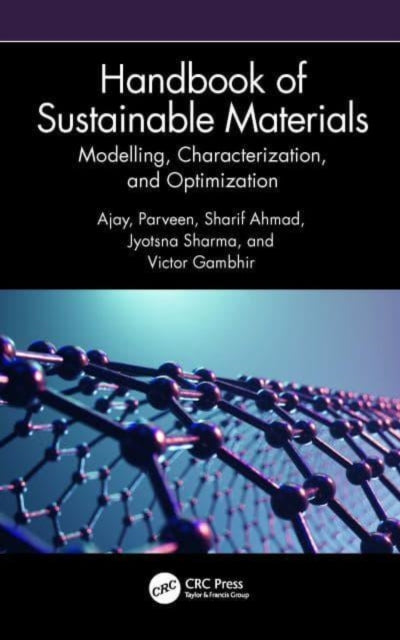Shulph Ink
Handbook of Sustainable Materials: Modelling, Characterization, and Optimization
Handbook of Sustainable Materials: Modelling, Characterization, and Optimization
YOU SAVE £7.20
- Condition: Brand new
- UK Delivery times: Usually arrives within 2 - 3 working days
- UK Shipping: Fee starts at £2.39. Subject to product weight & dimension
Bulk ordering. Want 15 or more copies? Get a personalised quote and bigger discounts. Learn more about bulk orders.
Couldn't load pickup availability
- More about Handbook of Sustainable Materials: Modelling, Characterization, and Optimization
Summarize the following in 30 to 50 words.
Recent developments in sustainable materials from various engineering fields and industry applications are presented, emphasizing analytical strategies, computational, and simulation approaches, and an artificial intelligence approach, rapid prototyping, and customized production. Chapters are written by global experts and include case studies and research outcomes.
Format: Hardback
Length: 486 pages
Publication date: 31 March 2023
Publisher: Taylor & Francis Ltd
Sustainable Materials: Innovations and Applications from Engineering and Industry
Sustainable materials have emerged as a critical focus area in various engineering fields and industry applications, driven by the urgent need to address environmental and resource challenges. In this comprehensive book, we delve into the latest developments in sustainable materials, emphasizing analytical strategies, computational, and simulation approaches that are driving the development of innovative and eco-friendly materials.
Chapter 1: Analytical Strategies for Sustainable Materials Development
This chapter explores the use of analytical techniques such as material characterization, thermodynamics, and kinetics to understand the fundamental properties and behavior of sustainable materials. It discusses the development of advanced characterization methods, such as X-ray diffraction, scanning electron microscopy, and Raman spectroscopy, to evaluate the structure, composition, and properties of sustainable materials. The chapter also highlights the importance of computational simulations in predicting the performance and behavior of sustainable materials under different environmental conditions.
Chapter 2: Computational Approaches for Sustainable Materials Design
Chapter 2 discusses the use of computational methods to design and optimize sustainable materials. It explores the development of computational models and algorithms that can simulate the behavior of materials at the molecular level, enabling the prediction of their properties, such as strength, stiffness, and thermal conductivity. The chapter also discusses the use of finite element analysis and computational fluid dynamics to simulate the mechanical and thermal properties of materials in complex structures.
Chapter 3: Simulation Approaches for Sustainable Materials Development
Chapter 3 explores the use of simulation approaches to develop sustainable materials. It discusses the development of simulation tools and methodologies that can simulate the behavior of materials at the macroscopic level, enabling the prediction of their performance in real-world applications. The chapter also highlights the use of multi-scale simulation approaches, which combine molecular and macroscopic simulations to capture the complex behavior of materials in complex systems.
Chapter 4: Artificial Intelligence Approach for Sustainable Materials Development
Chapter 4 discusses the use of artificial intelligence (AI) in sustainable materials development. It explores the development of AI algorithms and models that can analyze large datasets and identify patterns and relationships that can lead to the development of new sustainable materials. The chapter also discusses the use of AI in materials discovery, optimization, and customization.
Chapter 5: Rapid Prototyping for Sustainable Materials Development
Chapter 5 discusses the use of rapid prototyping techniques in sustainable materials development. It explores the development of 3D printing and other rapid prototyping technologies that can rapidly create prototypes of sustainable materials, enabling the evaluation of their performance and behavior in real-world applications. The chapter also discusses the use of rapid prototyping in the customization and personalization of sustainable materials.
Chapter 6: Customized Production of Sustainable Materials
Chapter 6 discusses the use of customized production techniques in sustainable materials development. It explores the development of manufacturing processes that can produce customized sustainable materials, tailored to specific applications and requirements. The chapter also discusses the use of additive manufacturing and other customized production techniques that can reduce waste and minimize the environmental impact of material production.
Chapter 7: Case Studies and Research Outcomes in Sustainable Materials Development
Chapter 7 presents case studies and research outcomes in sustainable materials development. It discusses the development of sustainable materials for various applications, such as transportation, energy, and construction. The chapter also highlights the research outcomes and challenges associated with sustainable materials development, such as material durability, cost-effectiveness, and scalability.
In conclusion, Sustainable Materials: Innovations and Applications from Engineering and Industry provides a comprehensive and up-to-date overview of the latest developments in sustainable materials. It emphasizes analytical strategies, computational, and simulation approaches that are driving the development of innovative and eco-friendly materials. The book is written by global experts and includes case studies and research outcomes that demonstrate the practical applications of sustainable materials in real-world applications. By exploring these developments, the book aims to inspire researchers, engineers, and policymakers to contribute to the sustainable materials revolution and create a more sustainable future.
Dimension: 234 x 156 (mm)
ISBN-13: 9781032286327
This item can be found in:
UK and International shipping information
UK and International shipping information
UK Delivery and returns information:
- Delivery within 2 - 3 days when ordering in the UK.
- Shipping fee for UK customers from £2.39. Fully tracked shipping service available.
- Returns policy: Return within 30 days of receipt for full refund.
International deliveries:
Shulph Ink now ships to Australia, Belgium, Canada, France, Germany, Ireland, Italy, India, Luxembourg Saudi Arabia, Singapore, Spain, Netherlands, New Zealand, United Arab Emirates, United States of America.
- Delivery times: within 5 - 10 days for international orders.
- Shipping fee: charges vary for overseas orders. Only tracked services are available for most international orders. Some countries have untracked shipping options.
- Customs charges: If ordering to addresses outside the United Kingdom, you may or may not incur additional customs and duties fees during local delivery.


